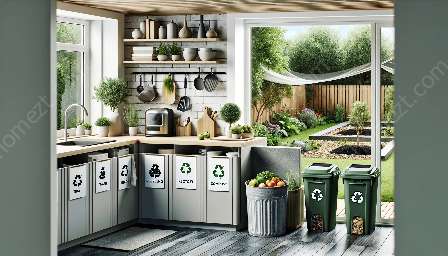Waste management is a critical aspect of environmental sustainability and public health. Proper waste management techniques and home cleansing techniques are essential for maintaining a clean and healthy living environment. In this comprehensive guide, we will explore various waste management options and methods that align with best practices for sustainable living.
Understanding Waste Management
Waste management involves the collection, transportation, processing, recycling, and disposal of waste materials. Effective waste management is crucial for minimizing environmental impact and promoting resource conservation. By implementing proper waste management techniques, individuals and communities can contribute to a cleaner and healthier planet.
Options for Waste Disposal
When it comes to waste disposal, multiple options are available, each with its own environmental implications. Landfill disposal is the most common method, but it has significant drawbacks, such as contributing to soil and water contamination. Incineration, while effective in reducing the volume of waste, raises concerns about air pollution and greenhouse gas emissions. Recycling, composting, and waste-to-energy technologies offer more sustainable alternatives that help reduce the burden on landfills and limit environmental harm.
Recycling
Recycling is a key component of sustainable waste management. By separating recyclable materials from the general waste stream, individuals can contribute to the conservation of natural resources and energy. Common materials that can be recycled include paper, plastic, glass, and metal. Through recycling initiatives, communities can minimize the need for raw material extraction, reduce energy consumption, and decrease greenhouse gas emissions.
Composting
Composting is an environmentally friendly method for managing organic waste. By composting food scraps, yard waste, and other organic materials, individuals can create nutrient-rich soil amendments for gardening and agriculture. This process helps divert organic waste from landfills and reduces greenhouse gas emissions associated with decomposition. Home composting techniques are accessible to individuals and families, making it a practical and sustainable waste management option.
Waste-to-Energy Technologies
Waste-to-energy technologies transform non-recyclable waste into usable energy, such as electricity or heat. These technologies can help reduce the reliance on fossil fuels and contribute to a circular economy by converting waste into valuable resources. While waste-to-energy facilities have the potential to offset greenhouse gas emissions and generate renewable energy, it is essential to consider their environmental and social impacts when implementing such systems.
Best Practices for Home Cleansing
In addition to employing effective waste management options, maintaining a clean and organized home environment is integral to overall well-being. Home cleansing techniques encompass various strategies for decluttering, cleaning, and organizing living spaces. By incorporating proper waste management practices into home cleansing routines, individuals can create a more sustainable and harmonious living environment.
Reducing Household Waste
Reducing household waste starts with mindful consumption and responsible purchasing habits. By opting for reusable products, minimizing single-use items, and embracing minimalism, individuals can decrease the volume of waste generated within their homes. Furthermore, proper segregation of waste into recyclable, organic, and non-recyclable categories enables efficient waste management and promotes a greener lifestyle.
Environmentally-Friendly Cleaning Products
Transitioning to environmentally-friendly cleaning products reduces the environmental impact of household cleaning practices. In contrast to conventional cleaning products that contain harsh chemicals and pollutants, eco-friendly alternatives are biodegradable, non-toxic, and safer for both human health and the environment. By choosing natural cleaning solutions, individuals can support sustainable waste management while maintaining a clean and healthy home environment.
Effective Waste Sorting and Storage
Establishing well-organized waste sorting and storage systems simplifies the process of waste disposal and recycling. By designating separate containers for recyclable materials, organic waste, and general waste, individuals can streamline waste management and encourage proper waste sorting habits. Adequate storage solutions, such as compost bins and recycling bins, ensure that waste materials are managed effectively within the home environment.
Conclusion
By embracing sustainable waste management options and methods, individuals can actively contribute to environmental conservation and resource efficiency. Incorporating proper waste management techniques and home cleansing practices into daily routines empowers individuals to create healthier living environments and reduce their ecological footprint. Through responsible waste disposal, recycling, composting, and home cleansing, we can collectively work towards a more sustainable future for generations to come.


